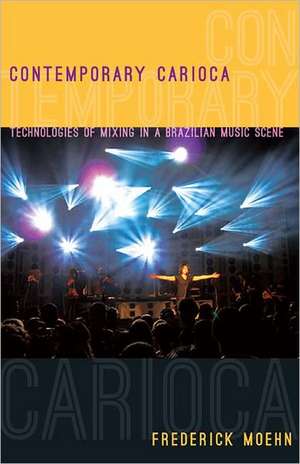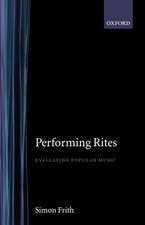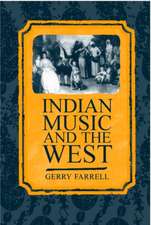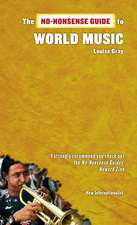Contemporary Carioca – Technologies of Mixing in a Brazilian Music Scene
Autor Frederick Moehnen Limba Engleză Paperback – 22 apr 2012
Preț: 263.68 lei
Nou
Puncte Express: 396
Preț estimativ în valută:
50.46€ • 52.79$ • 41.91£
50.46€ • 52.79$ • 41.91£
Carte tipărită la comandă
Livrare economică 02-16 aprilie
Preluare comenzi: 021 569.72.76
Specificații
ISBN-13: 9780822351559
ISBN-10: 0822351552
Pagini: 320
Ilustrații: 16 photographs, 1 map
Dimensiuni: 152 x 234 x 15 mm
Greutate: 0.44 kg
Editura: MD – Duke University Press
ISBN-10: 0822351552
Pagini: 320
Ilustrații: 16 photographs, 1 map
Dimensiuni: 152 x 234 x 15 mm
Greutate: 0.44 kg
Editura: MD – Duke University Press
Recenzii
Contemporary Carioca is an engaging study of musical production in contemporary Brazil that focuses on a group of Rio-based, middle-class musicians who emerged in the 1980s and 1990s and continue to produce innovative work. Among the books many strengths is its organization around individual artists and the ways that they have approached questions of globalization, national identity, social class, race, and gender. Frederick Moehn succeeds admirably in describing and analyzing the specificity of Brazilian strategies for negotiating global and local musical practices. Christopher Dunn, co-editor of Brazilian Popular Music and Citizenship
Frederick Moehn guides us on a scintillating exploration of Brazilian popular music of the 1990s, combining deep critical explication of the work of key performers with sharp delineation of that works place in the political and commercial context. No previous author has balanced intimate knowledge of popular music as a studio creation with careful exploration of the Brazilian cultural marketplace as successfully as Moehn does here. Bryan McCann, Georgetown University
...ethnomusicologist Frederick Moehn persuasively argues in his thoroughly researched study of the popular music scene in Rio de Janeiro since 1990s, the project to insert Brazil into pop, a reinvigoration of traditions immediately understood as Brazilian through the appropriation of international styles and methods was in fact the most Brazilian thing to do. Moehn cleanly dissects the complex sociology of the moment in his introduction, detailing how, among other factors, Brazils multiracial heritage, the cultural cannibalism that is a central tenet of Brazilian modernism, and the role of the middle class as an intellectual force as well as a consumer base, were all necessary ingredients for Música Popular Brasileiras giant steps since the 90s.... Contemporary Carioca is a solid scholarly text, and its a good read. - Bill Shoemaker, The Wire, August 2012
"Contemporary Carioca is an engaging study of musical production in contemporary Brazil that focuses on a group of Rio-based, middle-class musicians who emerged in the 1980s and 1990s and continue to produce innovative work. Among the book's many strengths is its organization around individual artists and the ways that they have approached questions of globalization, national identity, social class, race, and gender. Frederick Moehn succeeds admirably in describing and analyzing the specificity of Brazilian strategies for negotiating global and local musical practices." Christopher Dunn, co-editor of Brazilian Popular Music and Citizenship "Frederick Moehn guides us on a scintillating exploration of Brazilian popular music of the 1990s, combining deep critical explication of the work of key performers with sharp delineation of that work's place in the political and commercial context. No previous author has balanced intimate knowledge of popular music as a studio creation with careful exploration of the Brazilian cultural marketplace as successfully as Moehn does here." Bryan McCann, Georgetown University "...ethnomusicologist Frederick Moehn persuasively argues in his thoroughly researched study of the popular music scene in Rio de Janeiro since 1990s, the project to "insert Brazil into pop", a reinvigoration of traditions immediately understood as Brazilian through the appropriation of international styles and methods was in fact "the most Brazilian thing to do". Moehn cleanly dissects the complex sociology of the moment in his introduction, detailing how, among other factors, Brazil's multiracial heritage, the 'cultural cannibalism' that is a central tenet of Brazilian modernism, and the role of the middle class as an intellectual force as well as a consumer base, were all necessary ingredients for Musica Popular Brasileira's giant steps since the 90s... Contemporary Carioca is a solid scholarly text, and it's a good read." - Bill Shoemaker, The Wire, August 2012
Frederick Moehn guides us on a scintillating exploration of Brazilian popular music of the 1990s, combining deep critical explication of the work of key performers with sharp delineation of that works place in the political and commercial context. No previous author has balanced intimate knowledge of popular music as a studio creation with careful exploration of the Brazilian cultural marketplace as successfully as Moehn does here. Bryan McCann, Georgetown University
...ethnomusicologist Frederick Moehn persuasively argues in his thoroughly researched study of the popular music scene in Rio de Janeiro since 1990s, the project to insert Brazil into pop, a reinvigoration of traditions immediately understood as Brazilian through the appropriation of international styles and methods was in fact the most Brazilian thing to do. Moehn cleanly dissects the complex sociology of the moment in his introduction, detailing how, among other factors, Brazils multiracial heritage, the cultural cannibalism that is a central tenet of Brazilian modernism, and the role of the middle class as an intellectual force as well as a consumer base, were all necessary ingredients for Música Popular Brasileiras giant steps since the 90s.... Contemporary Carioca is a solid scholarly text, and its a good read. - Bill Shoemaker, The Wire, August 2012
"Contemporary Carioca is an engaging study of musical production in contemporary Brazil that focuses on a group of Rio-based, middle-class musicians who emerged in the 1980s and 1990s and continue to produce innovative work. Among the book's many strengths is its organization around individual artists and the ways that they have approached questions of globalization, national identity, social class, race, and gender. Frederick Moehn succeeds admirably in describing and analyzing the specificity of Brazilian strategies for negotiating global and local musical practices." Christopher Dunn, co-editor of Brazilian Popular Music and Citizenship "Frederick Moehn guides us on a scintillating exploration of Brazilian popular music of the 1990s, combining deep critical explication of the work of key performers with sharp delineation of that work's place in the political and commercial context. No previous author has balanced intimate knowledge of popular music as a studio creation with careful exploration of the Brazilian cultural marketplace as successfully as Moehn does here." Bryan McCann, Georgetown University "...ethnomusicologist Frederick Moehn persuasively argues in his thoroughly researched study of the popular music scene in Rio de Janeiro since 1990s, the project to "insert Brazil into pop", a reinvigoration of traditions immediately understood as Brazilian through the appropriation of international styles and methods was in fact "the most Brazilian thing to do". Moehn cleanly dissects the complex sociology of the moment in his introduction, detailing how, among other factors, Brazil's multiracial heritage, the 'cultural cannibalism' that is a central tenet of Brazilian modernism, and the role of the middle class as an intellectual force as well as a consumer base, were all necessary ingredients for Musica Popular Brasileira's giant steps since the 90s... Contemporary Carioca is a solid scholarly text, and it's a good read." - Bill Shoemaker, The Wire, August 2012
Notă biografică
Cuprins
List of Illustrations ix
Preface xi
Acknowledgments xxiii
Introduction 1
1. Marcos Suzano: A Carioca Blade Runner 25
2. Lenine: Pernambuco Speaking to the World 55
3. Pedro Luís and the Wall: Tupy Astronauts 92
4. Fernanda Abreu, Garota Carioca 130
5. Paulinho Moska: Difference and Repetition 167
6. On Cannibals and Chameleons 204
Appendix 1: About the Interviews, with a List of Interviews Cited 211
Appendix 2: Introductory Aspects of Marcos Suzano's Pandeiro Method 215
Notes 219
References 245
Discography 267
Index 269
Preface xi
Acknowledgments xxiii
Introduction 1
1. Marcos Suzano: A Carioca Blade Runner 25
2. Lenine: Pernambuco Speaking to the World 55
3. Pedro Luís and the Wall: Tupy Astronauts 92
4. Fernanda Abreu, Garota Carioca 130
5. Paulinho Moska: Difference and Repetition 167
6. On Cannibals and Chameleons 204
Appendix 1: About the Interviews, with a List of Interviews Cited 211
Appendix 2: Introductory Aspects of Marcos Suzano's Pandeiro Method 215
Notes 219
References 245
Discography 267
Index 269
Descriere
MPB or musica popular brasileira emerged in Brazil in the mid-1970s, toward the end of the military dictatorship. As a genre it was immensely popular, but it has not received the critical attention in the U.S. given to its predecessors: samba, bossa nova, and tropicalia. Moehn, an ethnomusicologist and a musician himself, spent time in Rio, interviewing and playing with some of the top performers in the genre. The central chapters form portraits of these stars, while offering insights into their concern to balance Brazilian and foreign elements creatively in their music.













